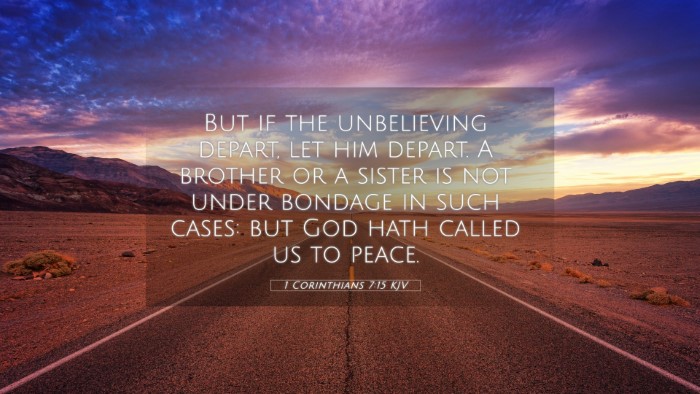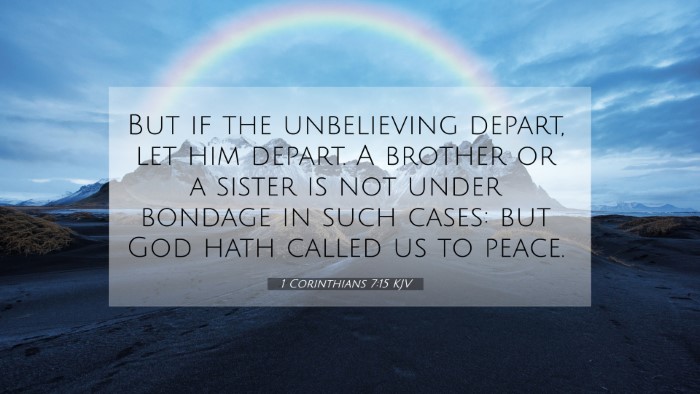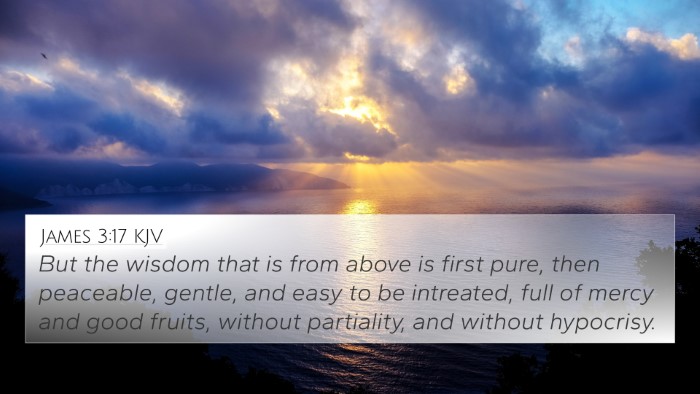Understanding 1 Corinthians 7:15
1 Corinthians 7:15 states: "But if the unbelieving depart, let him depart. A brother or a sister is not under bondage in such cases: but God hath called us to peace." This verse offers significant insights into the dynamics of marital relationships when faith is a dividing factor. Here, we explore the interpretation and implications of this verse, drawing from public domain commentaries including those by Matthew Henry, Albert Barnes, and Adam Clarke.
Summary of Meaning
This verse addresses a critical aspect of marriage and separation, particularly highlighting the situation of believers married to unbelievers. The Apostle Paul, in this letter, affirms that:
- Freedom from Bondage: When an unbelieving spouse chooses to leave the marriage, the believing partner is not bound to remain in that union. This provides a scriptural basis for the freedom to move on rather than live under constant strife.
- Call to Peace: The second part of the verse emphasizes that God’s intention for His people is peace. Therefore, enduring an impossible situation, especially one rooted in incompatibility of faith, can be seen as contrary to God's desires for a harmonious life.
Insights from Commentaries
Matthew Henry Commentary
Matthew Henry highlights that this verse reassures the believer in Christ that their salvation and relationship with God are paramount, even above the commitment to an earthly marriage that no longer thrives. He notes that the believer is not required to "sorrow" over an unbelieving spouse's departure, indicating a divine release from marital obligation when the partner does not share the same faith.
Albert Barnes Commentary
Albert Barnes provides insight into the cultural context of Paul's audience, noting the significance of a believer’s state within a mixed marriage. Barnes explains that while the believer should strive for a peaceful and harmonious relationship, they are not to remain shackled to a relationship that jeopardizes their spiritual life and peace. This guidance reflects a balanced view of human relationships in light of spiritual truths.
Adam Clarke Commentary
Adam Clarke elaborates on the idea of “peace” mentioned in the verse, stressing that God calls His children to live in tranquility. Clarke argues that when an unbeliever decides to leave, it should be seen as a release rather than a loss. He emphasizes the grace of God that allows believers to continue their walk with Him unburdened by the ties of an unfaithful partnership.
Bible Verse Cross-References
This verse can be cross-referenced with several others that speak to similar themes of separation, peace, and relationships:
- Matthew 19:6: "What therefore God hath joined together, let not man put asunder." - This verse reaffirms the sanctity of the marital bond while acknowledging circumstances that may lead to separation.
- Romans 12:18: "If it be possible, as much as lieth in you, live peaceably with all men." - This encourages believers to pursue peace in all relationships, including marriage.
- 2 Corinthians 6:14: "Be not unequally yoked together with unbelievers..." - Paul’s warning about the risks of mixed partnerships complements 1 Corinthians 7:15.
- 1 Peter 3:1: "Likewise, ye wives, be in subjection to your own husbands; that, if any obey not the word, they also may without the word be won by the conversation of the wives." - This verse discusses the influence a believer can have in an unbelieving marriage.
- Matthew 10:34-36: "Think not that I am come to send peace on earth: I came not to send peace, but a sword..." - This highlights the division that faith can cause in personal relationships, underscoring the reality faced by mixed-faith couples.
- Colossians 3:15: "And let the peace of God rule in your hearts..." - This reiterates the importance of peace in the lives of believers, particularly significant when faced with marital strife.
- 1 John 4:12: "No man hath seen God at any time. If we love one another, God dwelleth in us, and his love is perfected in us." - Offers the basis for understanding love within the context of any relationship.
Comparative Bible Verse Analysis
In examining 1 Corinthians 7:15, we see the theme of love and freedom from bondage that reoccurs throughout scripture. The inter-biblical dialogue found in these references illustrates an ongoing conversation about the nature of relationships, particularly when faith is a key element. To grasp the full weight of Paul's words, integrating these verses provides a comprehensive framework:
- Identifying Connections: Finding links between the teachings of the Old Testament and the New Testament can enhance our understanding of God's will for relationships.
- Thematic Bible Verse Connections: Recognizing similar themes, such as God's call to peace and the ideal of harmonious living, aids in deepening our insights into biblical teachings.
Tools for Bible Cross-Referencing
Utilizing tools for Bible cross-referencing can empower individual study of these connected verses:
- Bible Concordance: A comprehensive resource that lists words found in the Bible, useful for exploring connected themes.
- Cross-Reference Bible Study: Provides readers with references to related verses, enhancing understanding through comparative analysis.
- Bible Reference Resources: Guides to biblical texts that help in exploring the richness of scripture and its interconnectedness.
Conclusion
1 Corinthians 7:15 serves as a pivotal scripture that addresses the complex realities of marriage, particularly in mixed-belief relationships. By combining insights from esteemed commentaries and exploring Bible verse cross-references, we can appreciate the depth of Paul's message concerning peace and the freedom believers have when faced with difficult marital situations. As we engage in scriptural cross-referencing, we not only enhance our understanding but also recognize the enduring relevance of these teachings in today's context.











